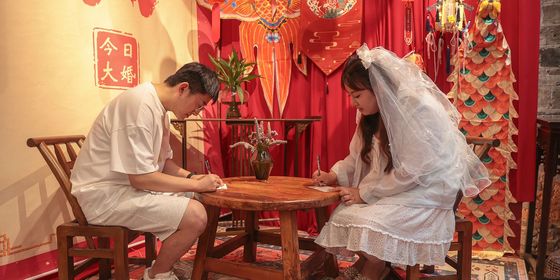A master of “vocal acrobatics” makes sound effects with his mouth, and describes how to train for this 2,000-year-old art
“No matter what country I go to, everyone can understand my art as a reflection of nature,” mimicry master Hai Yang observes, and neighs like a horse.
The 39-year-old Henan native has had a productive year: In 2017, he was part of the Beijing Acrobatic Society’s US tour, delighting audiences of 20,000 with his skill of imitating sounds using nothing but his mouth. On his return to China, Hai was invited to join the sound effects team of Wolf Warrior 2 (《战狼2》), the highest-grossing Chinese film in history, mimicking missile explosions, noisy tanks, and other sounds far beyond the traditional repertoire of this millennia-old art.
The historical records show that kouji (口技), literally “mouth acrobatics,” has been around China for over 2,300 years. Hai narrates with gusto the well-known story of Qin State prime minister Mengchangjun, a student of Confucius who lived during the Warring States period (475 - 221 BCE).
In 299 BCE, Mengchangjun was accused of spying for his native Qi state and imprisoned. The minister sought help from the King of Qin’s favorite concubine, Yan Fei, who, in return demanded a snow-white fox fur coat that Mengchangjun had already given to the king. With Mengchangjun caught in a quandary, his loyal servant (and skilled mimic) came to the rescue: In the middle of the night, the valet crept to the king’s quarters and imitated dogs barking, distracting the guards so he could steal back the coat.
Kouji then saved Mengchangjun again, when his entourage was trying to pass a mountain gate on the Qin-Qi border (in modern-day Shaanxi province), and found it closed for the night. With the king’s soldiers hot on the fugitives’ trail, Mengchangjun’s talented servant imitated a rooster, and real local roosters followed suit. The gatekeepers, thinking that morning had come, allowed them to cross the border.
During the Song dynasty (960 -1279), the art of kouji received imperial patronage. The chirruping of birds was one sound that the courtiers particularly enjoyed (according to Hai, birdsong was one of four natural metaphors for feminine beauty, along with flowers, willow, and the moon). The ability to mimic birds eventually earned kouji artists a regular spot opening state banquets. There were even compositions made up exclusively of kouji sounds, including “The Chant of a Hundred Birds” (百鸟鸣), which was especially popular due to the auspiciousness symbolized by 100 birds.
Hai claims that kouji reached such a level of mastery during this time that their chirruping could surpass that of the very birds they were mimicking. Song kouji master Zhang Kun Shan (张坤山) could supposedly make thrushes die trying to outmatch Zhang’s chirupping, earning him the nickname Hua Mei Zhang (画眉张) after the huamei species of thrush. Hai himself gleefully recalls showing off his skills before thrushes being sold in parks, riling them into a frenzy, much to the annoyance of their owners.
Most Chinese have some knowledge of the art thanks to the essay “Kouji,” which is part of the middle school curriculum. The text, written by early Qing scholar Lin Si Huan (林嗣环), vividly describes a theatrical kouji performance: The audience sits in front of a screen, behind which the kouji artist tells a story with sound effects—dogs barking, a baby crying, crockery falling—using nothing but his mouth, a wooden block, and a fan. The audience fills the gaps with their imagination.
Unlike his imperial predecessors, Hai was not groomed from a young age to pursue his art. As a child, he was drawn to vocal mimicry purely for fun; his first imitation was a rooster in his village. He chuckles when he recalls how his neighbors were fooled by Haiyang’s perfect imitation of a junk-collector’s hawking into turning up to discover there was no cart waiting on the road. In school, he sat next to windows and listened for sounds to imitate, but the teachers were none too fond of his disruptive noise-making—once, a loud imitation of an ambulance outside earned him 40 minutes’ standing in the corner.
It was a television show, Luo Sang Studies Art (洛桑学艺), that planted the seeds of becoming a kouji master. Hosted by kouji virtuoso Luo Sang (洛桑) and cross-talk master Yin Bolin (尹博林), the show ran from 1993 until late 1995, when Luo Sang died in a tragic car accident at age 27.
“When I first saw Luo Sang perform his trumpet and trombone imitation, I didn’t think his sounds were difficult to make, neither did I think my level was below his,” recalls Hai, who was 14 at the time. Hai began to study, hoping to eventually make the trip north, find Luo Sang’s former partner Bolin in Beijing, and start a new show together. In the pre-internet age, though, this was easier said than done, so in 1999, Hai joined the PLA’s Zhejiang division, intending to audition for the army’s performance troupe.
When Hai apparently failed to qualify, he startled the troupe leaders by performing the well-known soundtrack for the 1968 French war film Adieu l’ami outside their officers; he was invited to join, but then learned the reason for his initial rejection: His sergeant had been trying to prevent him from leaving their division. Four years later, another attempt was thwarted by the military chain of command, and Hai ended up a disillusioned white-collar worker in Beijing.
Years later, Hai heard that a famous kouji master, Niu Yuliang (牛玉亮), was performing for the Beijing acrobatic society. Through a combination of gift-giving and free meals, Hai wangled an invite to an event where Niu would be present. Six months later, he took an unexcused absence from work to help the old master, then over 70, on and off stage during rehearsal. Within a year, now aged 33, Hai became the old master’s apprentice. In 2014, Hai earned the formal title of Niu’s “student,” entering into a lineage stretching back over 2,000 years.
More than 20 years after he first saw Luo Sang Studies Art, Hai began performing on his own. The Acrobatic Society’s US tour brought kouji to venues such as the Kennedy Center, and 36-year-old Hai even attracted “groupies,” including Ivanka Trump, daughter of US President Donald Trump, who named Hai’s kouji act as one of her favorites at a Lunar New Year performance at the Chinese Embassy in Washington. While working on Wolf Warrior 2, Hai’s performance received guidance from China’s leading sound FX expert, and Steven Spielberg’s friend, Wei Junhua.
Hai says that becoming a kouji master is 98 percent practice, rather than talent. The range of sounds involves tapping into every possible motion of the human mouth and voice box, and every form of inhalation and exhalation, all in combination. When picking sounds, the key is to master all its variations in the real world—Hai demonstrates with a canine impression, from a hungry wolf to a depressed puppy.
Hai’s is now preparing to step into the shoes of his master, who will turn 80 next year. This involves learning certain classic compositions, as well as perfecting his own featuring sounds such as the xun (埙), an ancient egg-shaped wind instrument, and the bawu (巴乌) a reed pipe popular with ethnic minorities in Yunnan, and even the high-pitched singing of Peking Opera.
“The transmission of kouji has its limits because it can only be passed orally,” Hai observes, summarizing its development using the well-known chengyu, 青黄不接 (“the old and new crop have not joined”). Today, there are only a handful of trained kouji artists in China, and cultivating new talent is not easy: Unlike the high-flying gymnasts who perform alongside Hai, kouji artists are often late bloomers, and only achieve the status of “master” after decades of practice.
Nevertheless, Hai has taken on a few students, and his belief in the intrinsic value of kouji has grown over the years with its increasing exposure outside China. “You don’t have to speak a word of Chinese [to enjoy it],” says Hai, imitating a solemn trumpet from a military funeral.
“Kouji is borderless, all I hope is to continuing showing this art to the whole world,” he continues, and performs a one-minute sample of his latest composition—ending on the ambulance noise that got him punished by his teacher so many years ago.












